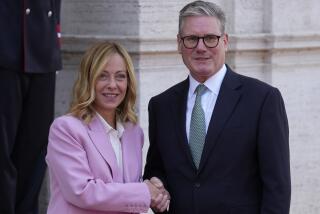Clinton Flying to Italy--and Into European Feud Over Neo-Fascists : Politics: EU allies angered by Berlusconi’s inclusion of controversial figures in Cabinet. U.S. takes a wait-and-see tack.
- Share via
ROME — Launching a nostalgic pilgrimage to salute the World War II victory over fascism, President Clinton flies today into a swirling, bitter European controversy with echoes from those desperate days half a century ago: Are the political heirs of Benito Mussolini trustworthy partners in a new Italian government?
Prime Minister Silvio Berlusconi, a billionaire businessman on the defensive over the inclusion of neo-fascists in his 2-week-old government, pledged anew Tuesday that there is no threat to democracy.
Berlusconi reassured a delegation from the Simon Wiesenthal Center in Los Angeles that he would support their call for the extradition from Argentina of Nazi war criminal Erich Priebke.
“Berlusconi said he was personally committed to see Priebke brought to trial in Rome,” said Rabbi Abraham Cooper, associate dean of the center and head of the delegation. “I spoke directly about concerns over neo-fascists in government, and I was very satisfied with Berlusconi’s responses.”
Clinton arrives about midnight for his first visit to Rome, a planned-to-the-minute extravaganza that will include talks Thursday with Berlusconi and a meeting with Pope John Paul II.
On Friday, the President delivers a major address at the U.S. military cemetery in Nettuno south of Rome. Clinton will honor soldiers who died in fighting after the 1944 amphibious landing at Anzio, one of the savage battles that marked the beginning of the end of World War II. On Saturday, the 50th anniversary of the liberation of Rome, Clinton flies to England and continues to France for D-day ceremonies on Normandy beaches Monday.
In assaying the new-look government of one of its closest allies, the United States has proved more sanguine about the five neo-fascist members of Berlusconi’s Cabinet than Italy’s partners in the European Union.
“Berlusconi has been elected. Let’s see if he knows how to do his job. Let’s give him a chance and support him,” Clinton told Italian reporters in Washington in an interview televised here over the weekend.
The 57-year-old self-made tycoon entered politics in January, led a right-wing electoral alliance to victory in March and won confirmation by Parliament in mid-May. Since then, however, Berlusconi has been repeatedly rebuffed by European partners for the neo-fascist elements in his coalition, and frustrated by allies at home in his efforts to effectively launch Italy’s first right-wing government since the war.
On Tuesday, in the latest incident, Socialist members of the European Parliament asked conservative colleagues to help bar neo-fascists from joining the assembly after European elections later this month.
In Brussels on Monday, Elio di Rupo, the Belgian vice premier and telecommunications minister and the son of Italian immigrants, refused to shake hands with his Italian counterpart, neo-fascist Giuseppe Tatarella, who was making his first visit. So did the Danish telecommunications minister.
Berlusconi was attacked by Italian commentators after reportedly telling an interviewer that Mussolini, who invented fascism and ruled Italy as dictator for two decades, had done some good things. The thin-skinned Italian prime minister now says he was misquoted.
Returned to office after more than four decades as pariahs, extremists among the neo-fascists are in full cry--to the embarrassment of Berlusconi and Gianfranco Fini, the leader of the neo-fascist coalition member National Alliance.
One neo-fascist member of Parliament is demanding veterans benefits for soldiers who fought for the rump republic that Mussolini formed in northern Italy after his overthrow in 1943. Another wants a constitutional prohibition against fascism lifted.
To Berlusconi’s distress, the shrill few have been louder than the quiet-spoken majority.
“The National Alliance condemns any totalitarianism and certainly does not propose a model for a totalitarian or despotic state,” Fini told state radio over the weekend.
Fini, a slick, 42-year-old professional politician, has made neo-fascism politically acceptable. But he also triggered a storm after the election by declaring that Mussolini was the century’s greatest statesman. He says he was quoted out of context.
Many of Berlusconi’s ministers are more technocrat than politician, and in the economic and international arenas they are well-respected. Foreign Minister Antonio Martino, a university professor, won high marks on confidence-building visits to Washington and Brussels.
“I’m sure there will be no difficulty in collaboration between Britain and Italy,” British Foreign Secretary Douglas Hurd said after meeting Martino in Brussels.
Berlusconi--who promises a jobs-producing, more efficient government that is based on free-market economics and is able to pay its bills--asks to be evaluated “on the basis of facts and not on prejudices.”
That was an appeal he made again Tuesday in conversation with the Wiesenthal Center delegation, which has been pressing for vigorous Italian action to bring Priebke to trial. The former SS captain has confessed to being second in command of German soldiers who executed 335 Italian civilians, about 75 of them Jews, at the Ardeatine Caves south of Rome in 1944.
More to Read
Get the L.A. Times Politics newsletter
Deeply reported insights into legislation, politics and policy from Sacramento, Washington and beyond. In your inbox three times per week.
You may occasionally receive promotional content from the Los Angeles Times.










